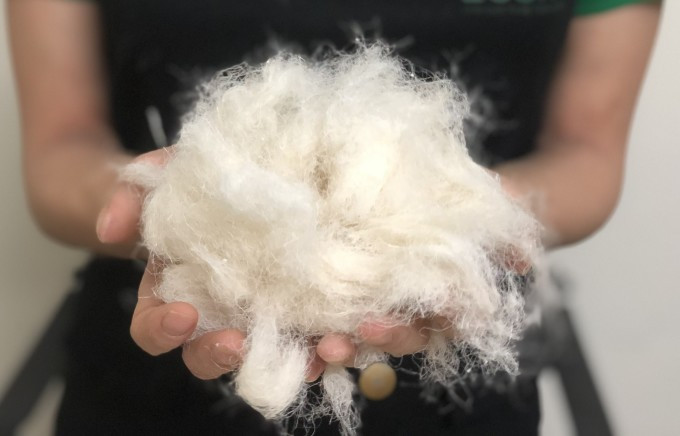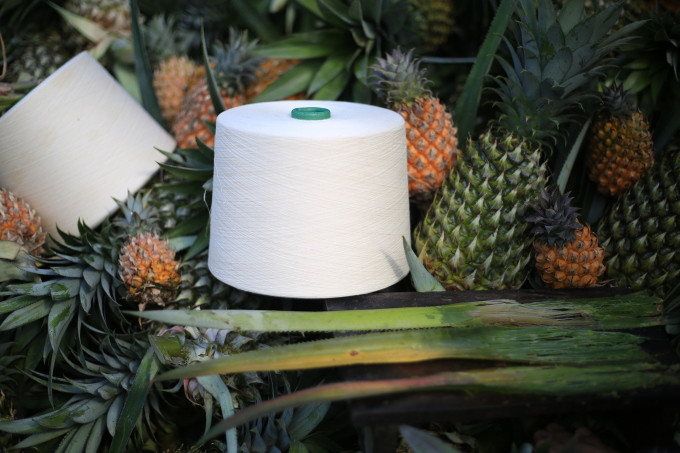For the first time in Vietnam, there is a unit producing textile materials from pineapple leaves and fruits on a mass scale, with an output of 18 tons of yarn per month.

Cooperating with farmers and cooperatives in Dien Bien, Ninh Binh, Thanh Hoa, Nghe An, Tien Giang to harvest pineapple leaves and fruits, startup Ecofa Vietnam turns them into silk and yarn for the textile industry. This is the result of more than 3 years of research and testing by this company.
The process of producing raw pineapple fiber and cottonizing pineapple leaf fiber goes through 18 stages, but basically includes extracting raw pineapple fiber (same color & length) from the leaves, then cottonizing the raw fiber into silk (ensuring uniform color, moisture, length & thinness). At this point, pineapple silk is used to spin yarn and weave fabric.
Founder and engineer Dau Van Nam said that producing fiber from pineapple leaves and fruits is not new, but it has previously been limited to traditional, small-scale production. Traditional methods of spinning long fibers cannot produce enough silk to meet the standards for yarn and textile factories. "We do not want to miss the opportunity to be the first," he said.
So in mid-2021, he began testing pineapple silk production using a machine he invented. "The process of producing pineapple silk on a large scale using a machine was gradually perfected through many years of failed experiments," Nam admitted.
During this process, the startup found a like-minded partner, Bao Lan Textile, a unit specializing in the R&D of ecological fabrics. They have joined hands in the past 3 years to complete the entire chain of processing post-harvest waste products including pineapple leaves and fruits into fabric that can be used to make clothes.
By early this year, Ecofa was able to source 18 tons of pineapple cottonized fiber from more than one million tons of harvested pineapple leaves each month. The company expects to increase production to 50 tons per month by the end of 2025.
This source of raw materials from Ecofa will be provided to Bao Lan Textile to weave into fabric for the textile, garment, fashion, and interior industries, under the brand name Ananas. Depending on the intended use, pineapple leaf silk is custom-blended with other ecological fibers such as organic cotton, bamboo biocell (a type of young fiber produced using closed loop system technology), silk, and wool.
From there, they can create materials such as jeans, elastic, towels, woven fabrics, knitted fabrics. "Pineapple yarn is a material that already exists, but we have developed it together as a new brand with an entrepreneurial spirit," said Dave Quach, Founder of Bao Lan Textile.
Ho Chi Minh City Textile Research Institute (VTRSI-TTC) and Nissenken Technical Testing & Analysis Organization (Japan) have certified 4 features of pineapple leaf fabric developed by these 2 startups, including: fabric durability, natural deodorization on fibers, natural antibacterial on fibers, natural UV protection on silk up to 50+UPF.

According to textile experts, pineapple fabric was known around the 17th century, most commonly in the Philippines. However, all the stages of making the fabric were complicated and only used rudimentary tools, so the output was low, making the price expensive and rarely used. This material was forgotten when cheap industrial textiles took over after the 19th century.
However, the green consumption trend has promoted a wave of startups, helping to "revive" pineapple leaves and fruits for widespread application in today's life. Some countries such as the Philippines, Costa Rica, and Bangladesh have also successfully researched and commercialized pineapple fibers in recent times.
Ms. Nguyen Thi Tuyet Mai, Deputy Secretary General of the Vietnam Textile and Apparel Association (VITAS), said that the type of fiber and fabric introduced by these two startups marks a turning point connecting the pineapple farming industry and the global green fashion trend.
"In the context of the domestic and global textile industry lacking raw materials for production towards green fashion, the two companies' success in researching and mass-producing pineapple fiber with sufficient quality for garment fabrics has a positive impact on the demand and development of the industry, not only in Vietnam," said Ms. Mai.
According to the forecast of The Business Research Company (UK), the size of the world natural fiber market will grow from 63.62 billion USD in 2021 to 77.12 billion USD in 2026. Founder Dave Quach said that fabric from pineapple leaves and fruits has good export prospects. His company is negotiating with some foreign purchasing partners and cannot disclose more details at the moment.
TH (according to VnExpress)